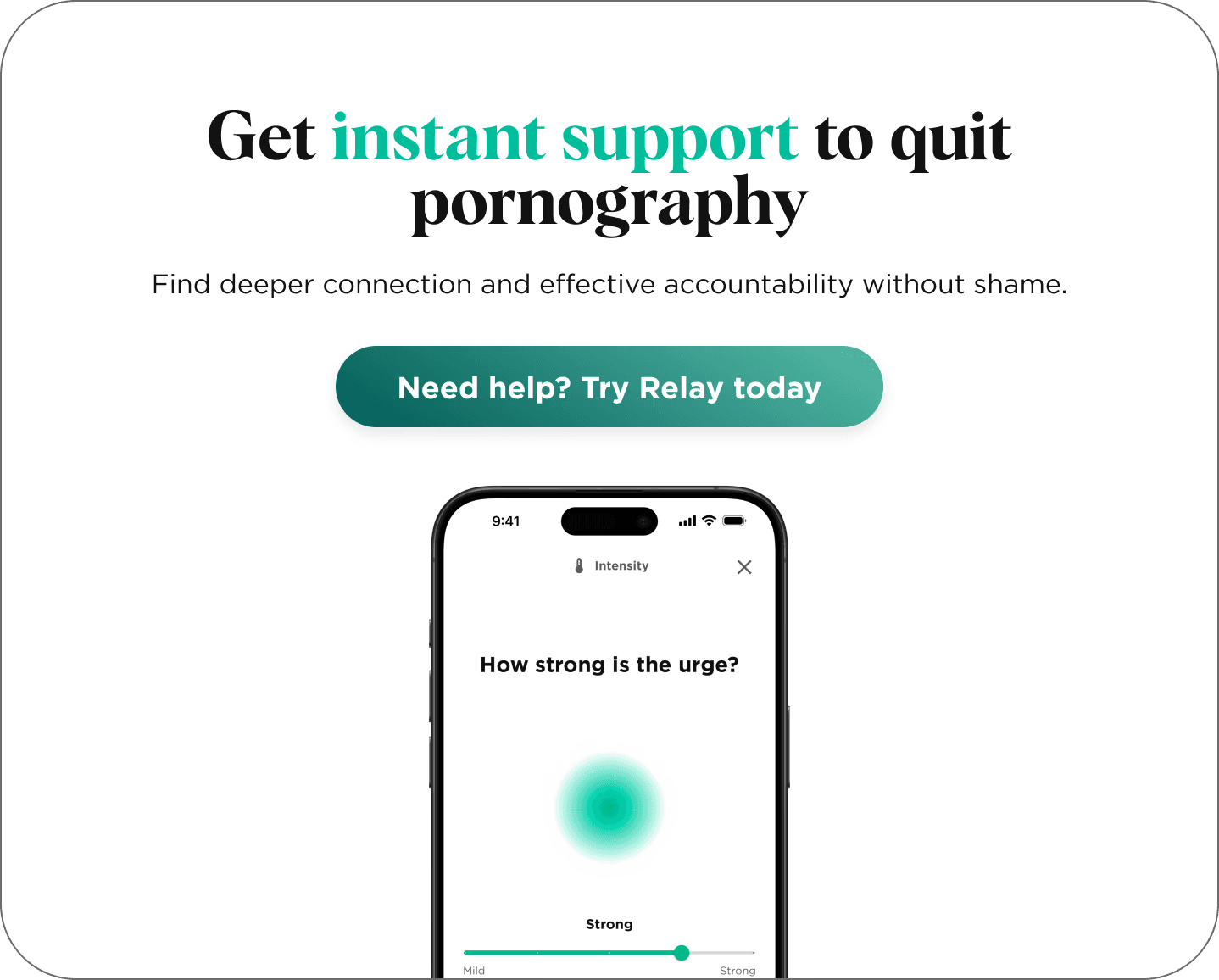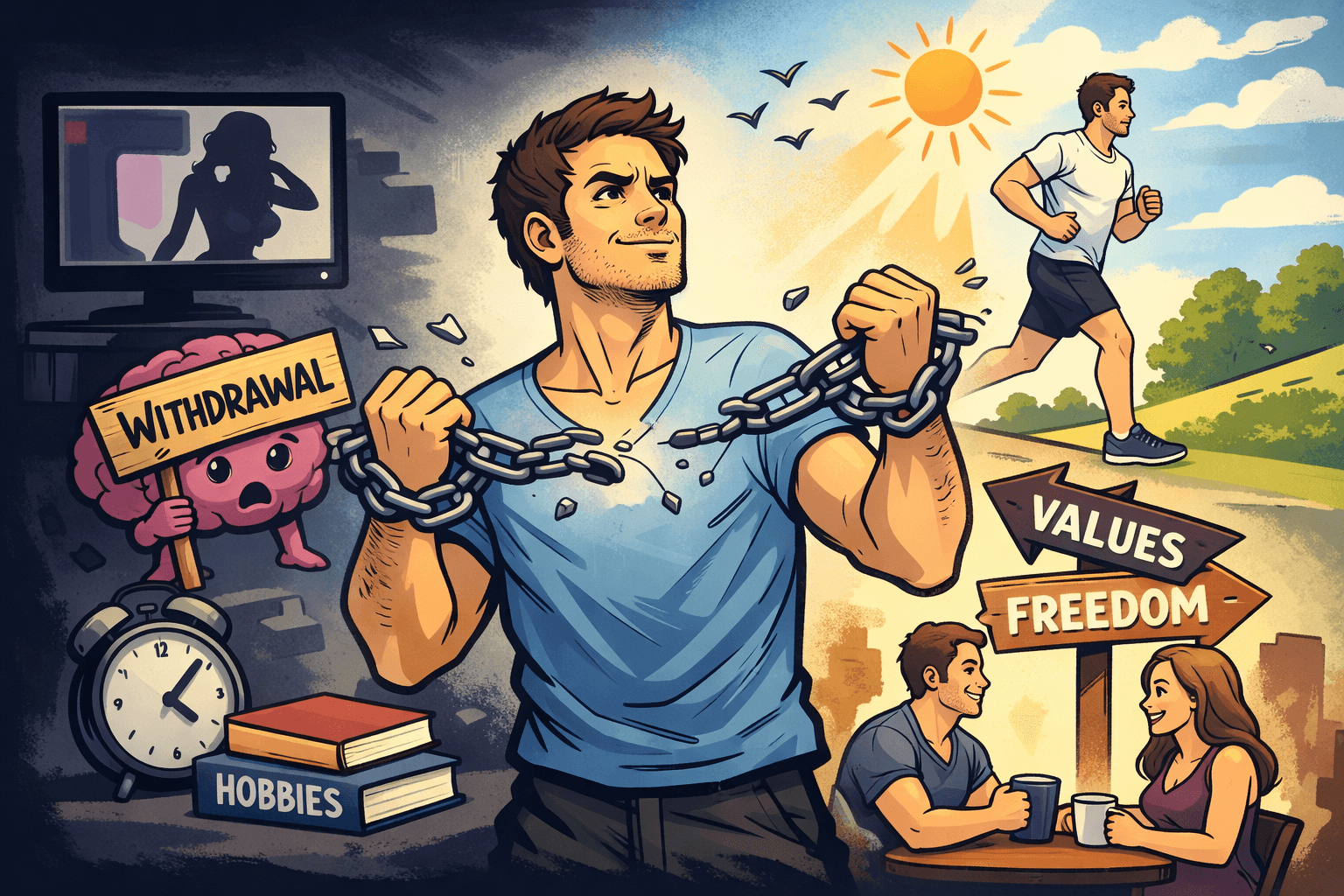
What follows is a list of my personal experiences when I stopped watching porn. While I use scientific language to describe plausible mechanisms of action in some of my experiences, this is not a research paper or a clinical document.
It’s my personal, first-hand experience. I hope that my experiences can help you, no matter where you are in your journey to quit porn.
I’m assuming you’re on this page because you’re wondering what’s going to happen if you stop watching porn.
Before I tell you my experiences and what to possibly expect, we have to start the most important mental shift to help you stay committed to your goal of quitting.
No one can make you stop watching porn
Further reading: How to stop watching porn—advice from a man who struggled
It’s the one addiction where there is no method for outside interference.
If you’re addicted to drugs or alcohol, you might end up in prison as a result of your actions. While it’s possible to get access to that stuff in there, for many people, it will be prohibitively expensive, so you’ll end up quitting by default.
If you’re addicted to food, there are GLP-1 agonists that kill your appetite.
If you’re addicted to gambling, you will eventually run out of money.
This is not to say that these external barriers will cure your addiction. You may still want to drink, get high, eat to excess (when the GLP-1 agonist wears off), or gamble, but those addictions can eventually put you in a position where it’s impossible to fulfill them.
You can hit rock bottom in a very way. But porn addiction isn’t like that.
As long as you aren’t consuming content with minors, watching porn is legal in most of the world.
Since there is no rock bottom for porn addiction, you have to personally decide when enough is enough and do what needs to be done to quit porn.
If you don’t want to quit, no one can make you quit. But if you want to, then it falls into the category of “simple but not easy.”
What actually happens when you quit porn—my experiences
In the short term, there are both positive and negative things that happened when I quit porn.
In the long term, I realized that all the changes were positive.
They only seemed negative because they were either temporary discomfort or a permanent change in how I lived.
Here are all the things that happened when I stopped watching porn.
You’ll think about watching porn
The first thing you’ll notice when you decide to stop watching porn is how much you think about not watching porn.
It’s like if I told you not to think about an elephant. The first thing you’re going to do is think about the elephant. You can’t help it because I said the word “elephant.”
You probably won’t start thinking about cats, dogs, what’s for dinner, any bills you have due, or anything else vital to your life. Because I explicitly told you to *not* think about an elephant, that’s what you’ll think about.
Quitting porn is a lot like that.
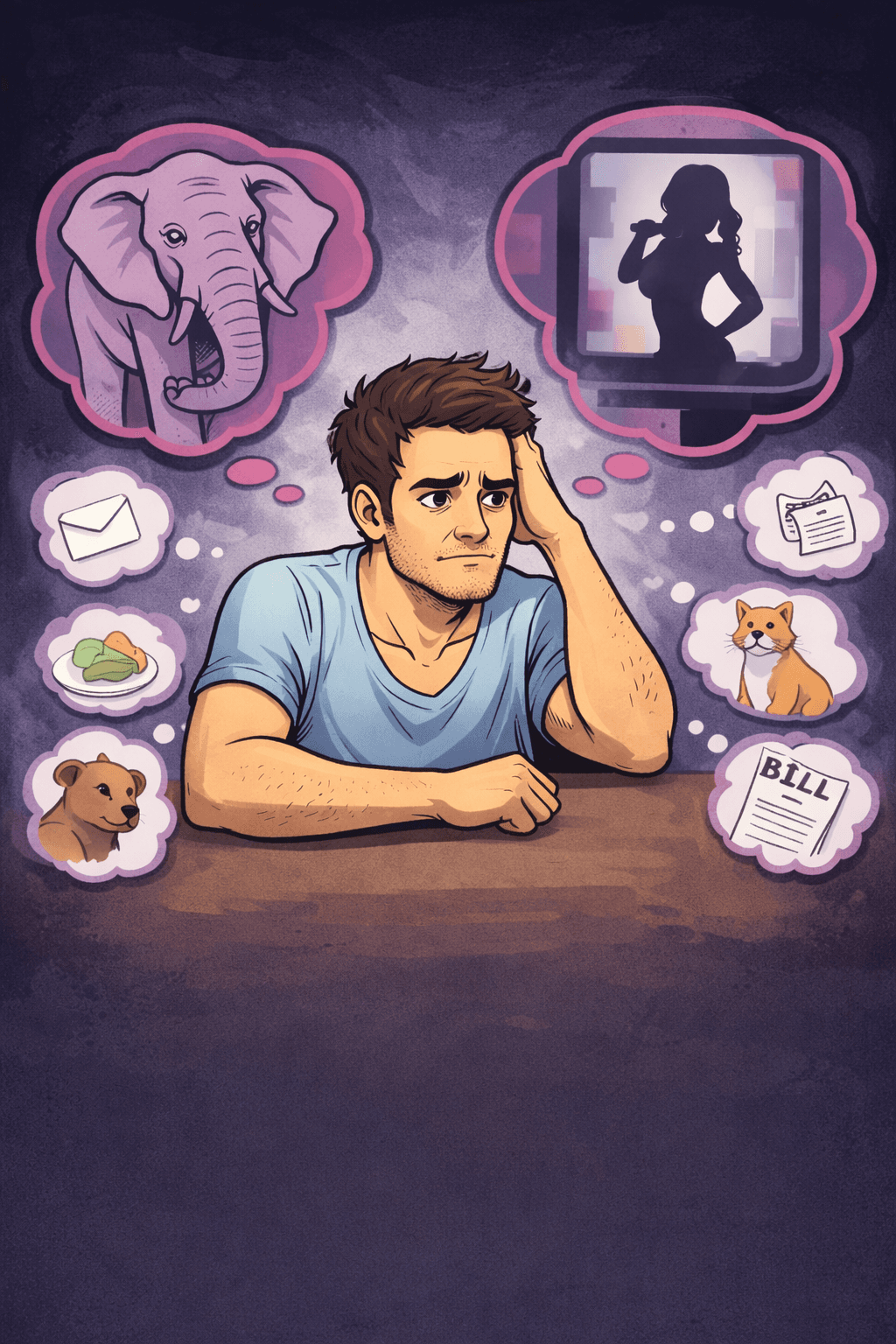
If you’re thinking about *not* watching porn, you have to first think about watching porn. At the very least, you have to think about porn.
What helped me, counterintuitively, was not declaring a quit date, counting my porn streak, or anything like that.
These things are useful in the long run, but to build momentum, I did not think about stopping. I just dealt with urges as they came and committed to not giving in to them.
While you will obviously come to a point where you are confronted with an urge to watch, try not to make a big deal about it either way. Don’t build in unnecessary mental tension and expectation by declaring a quit date or anything like that.
Just manage your urges.
Further reading: How to use urge surfing to quit porn addiction faster
My sex drive skyrocketed
You might think you have a high sex drive because you need to constantly watch porn. At least that’s what I thought.
The truth is that a lot of the reasons you watch pornography is because it is hyper-stimulating. I found that I was thinking about sex as much as I was thinking about watching porn. Although the end result of an orgasm is the same, they are very different things.
It’s easy to confuse a high sex drive with a pornography addiction, but you can only experience the former if you conquer the latter.
I don’t want to paint the idea that your sex drive is going to become like that of an 18-year-old boy, but many men don’t realize how damaging the consumption of artificial sex is to their desire for the real thing.
The reality is that you’ll just be returning to normal.
I knew my sex drive was coming back when I started to enjoy talking to and looking at real women, without a sexual agenda or objectifying them.
Now that seems counterintuitive—my sex drive came back so I was able to enjoy women non-sexually—but here is my completely non-scientific explanation.
Pornography trains you to see women as only sex objects.
If you watch a lot of pornography, it’s not a stretch to say that most of your “interactions” with women are with women being sexually provocative. When you’re deep in porn consumption, women fall into one of two buckets: they’re either there for you to masturbate to or they don’t exist.
Couple this with the addictive nature of porn, and you get a situation where you have zero tolerance for any aspect of interacting with women outside of sex.
But with a healthy sex drive, you actually come to enjoy interacting with them.
A conversation no longer feels intimidating because you aren’t having it with the express goal of sleeping with her. You can admire a beautiful woman for reasons other than her sex appeal.

Here’s a quick test:
Could you find a woman in jeans and a sweater enjoyable to talk to on a date where you knew sex wasn’t an option?
The funny thing about this change is that it will dramatically improve your success with women and make it more likely that they’ll have sex with you.
The downstream effect of this is that I actually developed female friendships. I used to be a guy who did not think men and women could be friends because I only saw women as sexual objects.
Removing porn had a significant impact on reshaping those expectations and enriching my life with many more friendships.
My dating choices improved
I don’t think it’s a coincidence that right around the time I stopped watching porn is when I met my wife.
I had no problem meeting girls, but meeting women I actually liked and who were a net positive in my life was a different story.
This is because I was only looking at girls as sexual objects. I invested massive amounts of time and energy into pursuing a girl just to get her into bed. As a result, I experienced an emotional version of the sunk-cost fallacy.
Because I put so much time into a girl and I valued sex about all things, that made me emotionally attached to people I didn’t really like and who were just not good matches for me.

But because I invested so much time into trying to have sex with them, it brainwashed me into thinking I was really into them, and I behaved as such.
This meant getting irrationally jealous or just wasting time with girls who were a bad fit. And here’s the thing about spending time with girls who are a bad fit:
Every moment spent with the wrong person is one moment you don’t get to use to meet the right person.
Further reading: Porn in marriage
You get your time back
Watching porn takes up a lot of time. At first glance, it doesn’t seem like much. A few minutes is all it takes, in theory, to masturbate. In practice, you need to find the perfect scene. That usually takes a few minutes.
You usually have to wait until you have alone time. If there are other people in the house, or if you have a family, it means giving up precious time to do something else.
Speaking of time spent on something else, there is a tremendous cognitive cost to task switching. When you stop doing one thing and start doing something else, you have to reset your focus so you can get into the task.
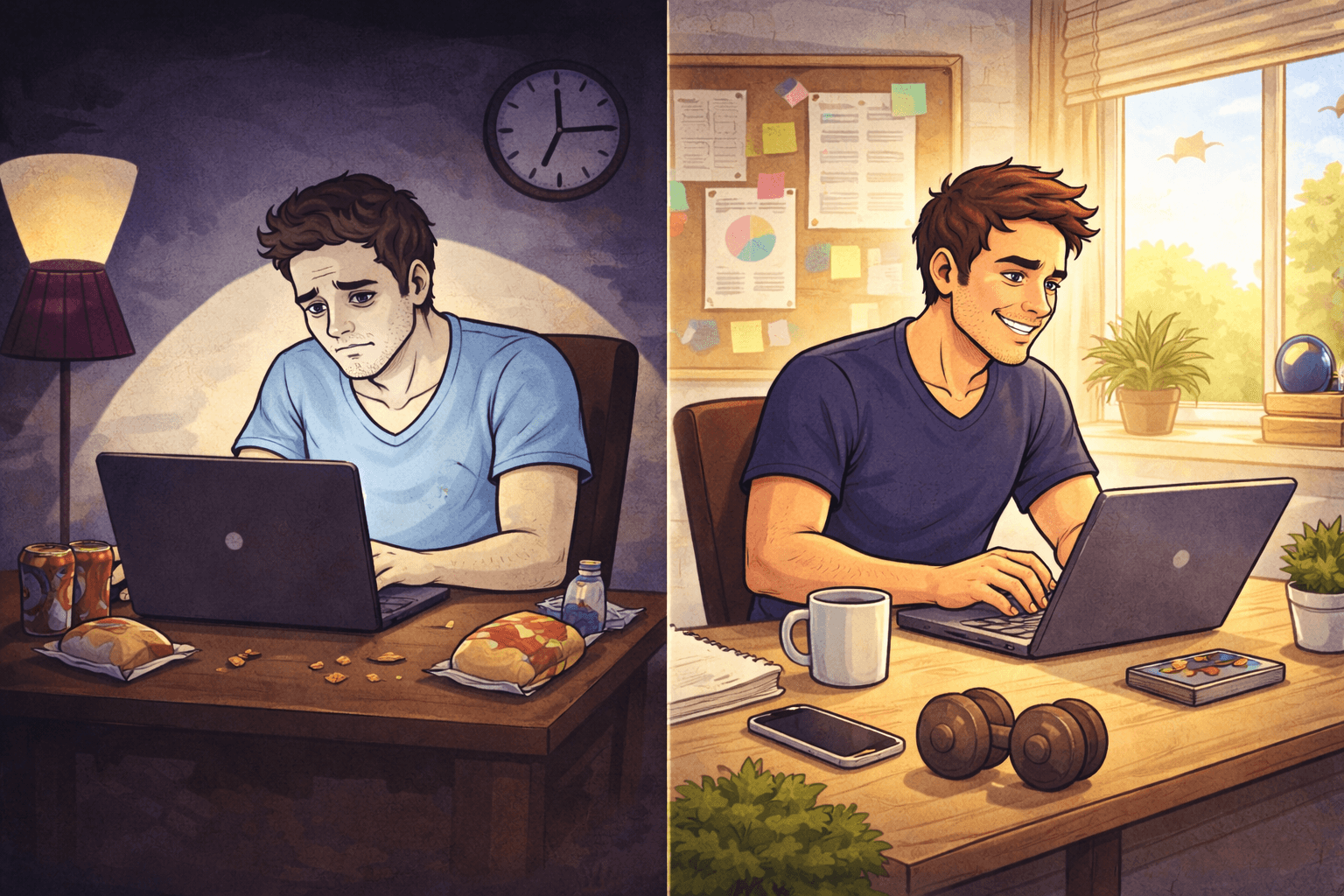
That start-and-stop can make it incredibly difficult to be productive and make progress in other areas of your life.
You’ll also stop planning your activities around the possibility of watching porn.
This is potentially a big deal, largely because it lets you plan your life around what matters and what will improve your quality of life.
I faced the demons I was hiding from
Watching porn is like any other addiction. It’s often used to keep you from dealing with potentially traumatic issues.
I watched porn to keep myself from dealing with a fear of rejection that was rooted in childhood trauma. A lot of my alcoholism was rooted in the issue.
I used porn to comfort me so I didn’t have to go out, or when I did, I figured it would keep me from taking my desire for female attention so seriously. That way, I wouldn’t be crushed if I didn’t receive it.

Of course, that doesn’t work because pornography is not sex, and it can’t deliver the things you get from everything else that comes with sex, like the relationship that tends to lead to it.
I’m not saying that you will necessarily want to settle down and become monogamous (unless that’s part of the demons you’re avoiding through porn), but you will realize that porn was something you were using to fill a void, and you ended up feeding it instead.
My morals got stronger
The only way you can ethically watch pornography is by ignoring some ugly truths about the industry.
A large number of women are trafficked into making the content
A lot of the content is filmed in countries with few economic opportunities, so the girls have to do it to survive
Many of the girls who enter the industry voluntarily have been sexually abused as children
And there are a lot of girls who end up in these videos who have no idea they’re even being filmed
I don’t care what healthy, consenting adults decide to do, but it’s impossible to know if that’s what you’re watching.
When you’re watching porn, you won’t care about these things. At the very least, the addiction will be stronger than your empathy.
But once you stop, you develop a conscience. Especially if you learn the truth about the adult industry.
Even if you aren’t explicitly educated on the nature of pornography, breaking from the addiction allows you to see it objectively, without motivated reasoning.
It became hard for me to believe that most people enter that industry under healthy, fully informed conditions.
When you combine that with the long-lived, ubiquitous nature of the content, it only leaves two possible interpretations:
Either the girl is too young to know better and lacks the guidance and support in her life to tell her otherwise, or she was forced into it.
Will you go through withdrawal when you stop watching porn?
Yes — but “withdrawal” from porn doesn’t look the same as withdrawal from drugs or alcohol, and that distinction matters.
When people talk about porn withdrawal, they’re usually describing two different experiences that get lumped together under the same label.
Thinking about watching porn (urges, not sexual desire)
The most immediate thing you’ll notice after you stop watching porn is how often you think about not watching porn.
This is not the same thing as wanting to have sex.
Everyone has a sex drive. Not everyone watches porn. If you were watching a lot of porn before you quit, your brain is conditioned to expect that stimulation. As a result, thoughts about porn will surface whether you want them to or not.
There’s no way around that.
What helped me most was focusing on three practical pillars:
Keeping myself busy
Avoiding triggering situations
Making it difficult to watch porn, even if I wanted to
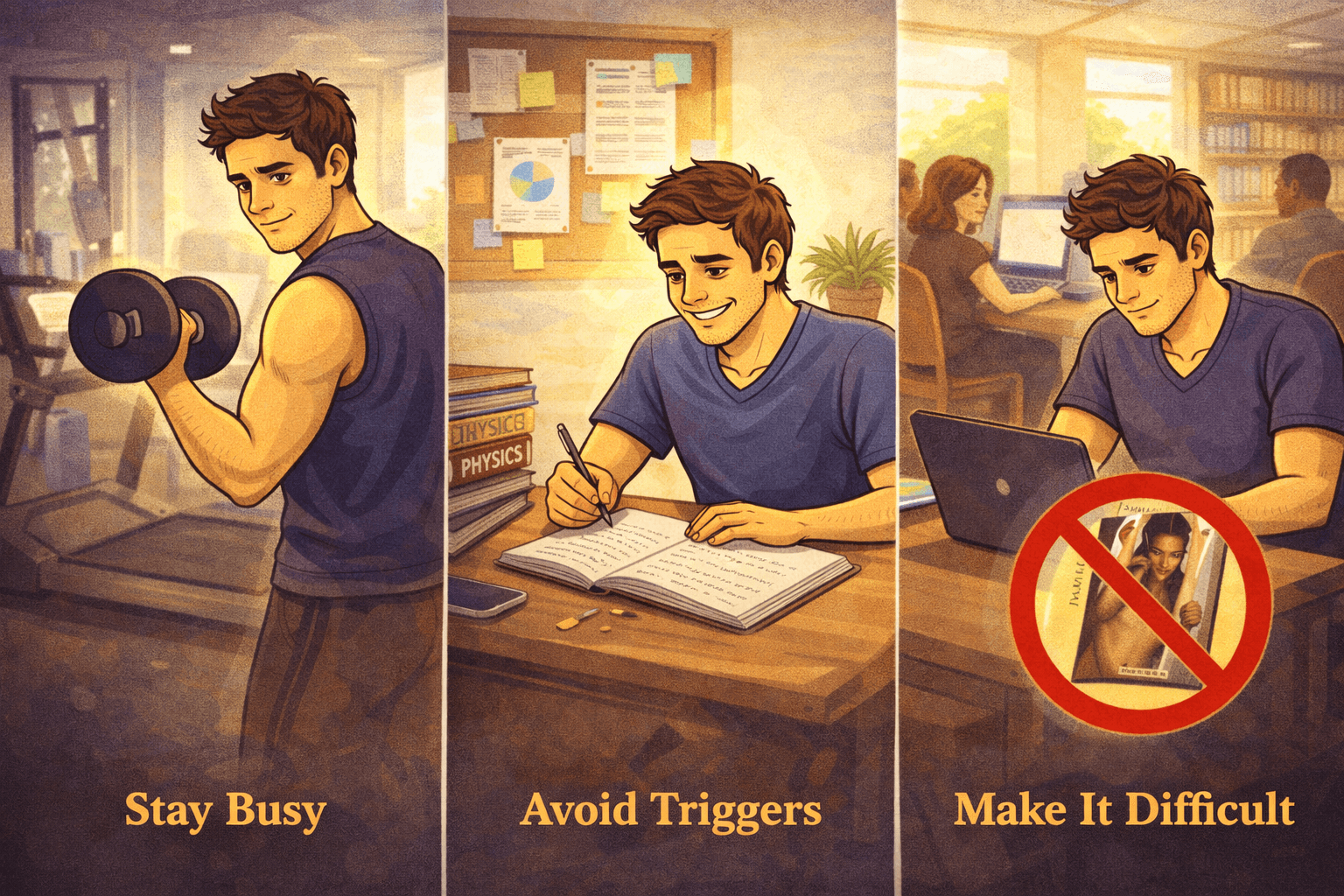
In practice, that meant:
Working out and studying to stay occupied
Avoiding erotic material entirely
Using my computer only in public or shared spaces
Everyone’s exact approach will look different, but as long as those three goals are met, the strategy works.
Adjustment symptoms after quitting porn
The other side of “withdrawal” involves the physical and mental adjustments that happen when porn is removed.
I hesitate to even call this withdrawal, but in the strictest sense, these are symptoms that appear because your brain is adapting to the absence of artificial stimulation.
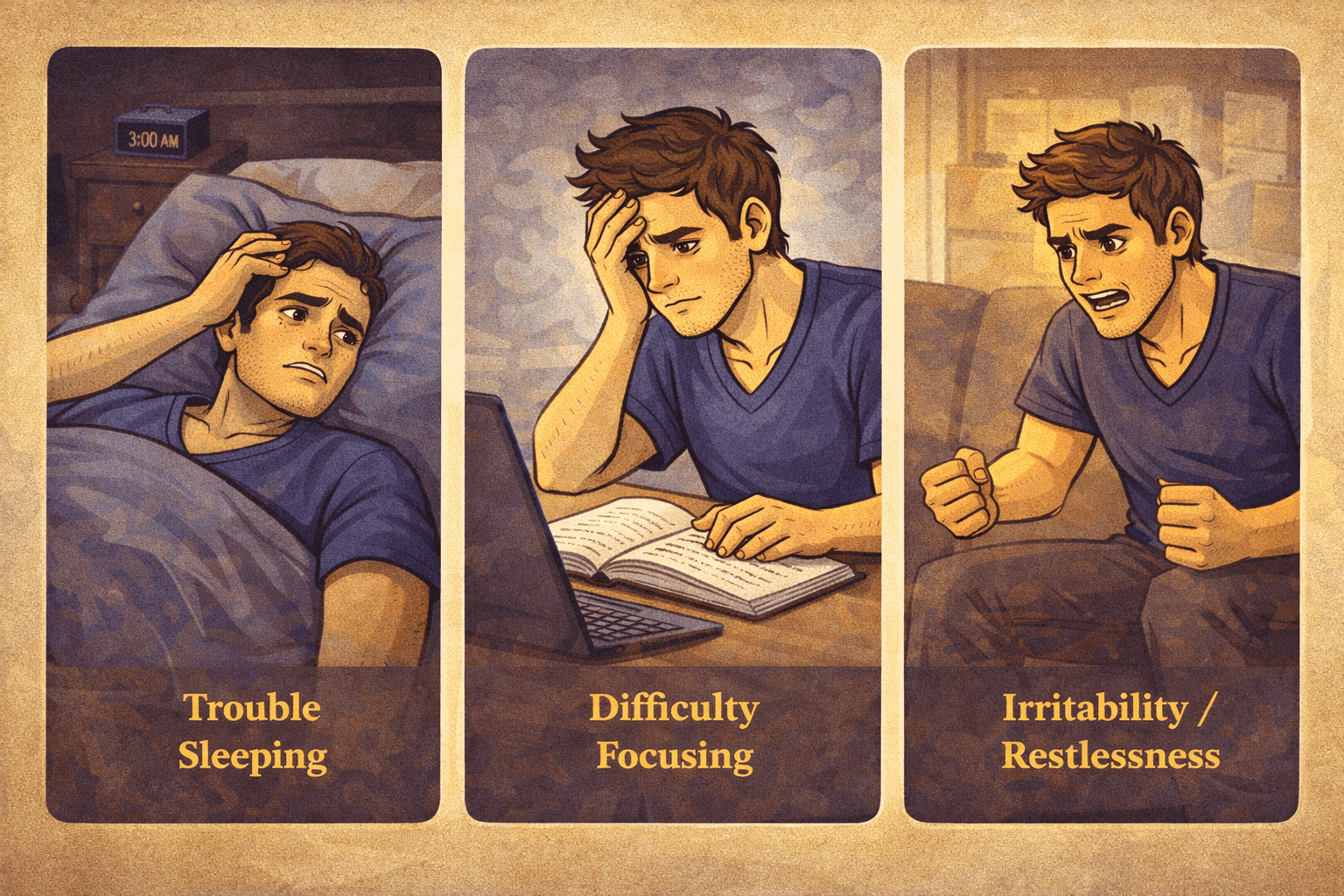
Commonly reported symptoms include:
Trouble sleeping
Difficulty focusing
Irritability or restlessness
Temporary libido changes (a spike for some, a flatline for others)
Mental fog or emotional flatness
Personally, I did not experience libido flatline or brain fog — two symptoms many men report. What I did experience was difficulty sleeping and focusing.
I attribute the sleep issues to breaking the habit of using porn as part of my bedtime routine. The focus issues were likely a combination of distraction from porn-related thoughts and my brain recalibrating after years of high-dopamine stimulation.
These symptoms weren’t permanent, and they weren’t a sign that anything was wrong. They were simply part of the adjustment process.
Is there a timeline for what happens when you stop watching porn?
It would be nice if I could say, “On day X you’ll feel this, on day Y you’ll feel that, and by day Z everything will be fine.”
That’s not how this works.
There isn’t a rigid timeline because everyone’s porn use is different. How often you watched, how long you watched, and what role it played in your life all matter.
That said, there are predictable phases most people move through when they quit. Based on my experience and what I’ve seen from other men, here’s what you can realistically expect.
The first few days: discomfort, not crisis
The first few days are usually uncomfortable, but they’re rarely the hardest part.
What you’re mostly dealing with here is change. You’re breaking a habit, disrupting a routine, and removing a familiar coping mechanism. Things feel off, but this phase is more about change than about unbearable strain. Your brain hasn’t fully realized yet that porn is no longer part of the equation.
One to two weeks in: this is usually the hardest phase
Contrary to what you’ll often hear, the most intense part usually comes after the first few days.
About a week or two in, your brain starts to notice something important: the dopamine spike it was expecting from porn hasn’t arrived.
That’s when urges feel louder, temptation feels more aggressive, and your mind starts bargaining and rationalizing. This is the point where many people cave, not because they’re weak, but because this is when the system is under the most stress.
If you make it through this window, things tend to get noticeably easier.
Early improvements: time, energy, and productivity return quickly
Some changes happen surprisingly fast.
Once porn is gone, you immediately get your time back. You stop planning your day around opportunities to watch porn, and focus and productivity begin to improve. These changes don’t require healing. They’re simply the absence of distraction.
In a strange twist of neuroscience, libido often increases during this phase. Your brain realizes its source of artificial stimulation is gone and starts pushing harder for real outlets.
If you’re in a relationship, this can be a great period. If you aren’t, it can be one of the most tempting. That’s why staying busy during this phase matters so much.
Longer-term changes: social and moral shifts take more time
The deeper changes happen more slowly.
How you see women, what you tolerate in dating, and how you feel about pornography itself tend to shift over time rather than all at once. You may find yourself arguing with your own motivated reasoning, justifying porn on one hand while feeling uneasy about your participation in it on the other.
That tension is normal.
With time, clarity replaces conflict. And once you see porn clearly, it becomes much harder to go back to seeing it the way you once did.
The bottom line on timelines
It generally gets worse before it gets better, but it also gets better sooner than most people expect, provided they don’t quit during the hardest phase.
There’s no exact schedule, but there is a pattern: early discomfort, a tougher middle stretch, gradual stabilization, and long-term improvement.
Understanding that pattern ahead of time makes it much easier to stay the course.
Frequently asked questions about what happens when you quit porn
Is it normal to feel worse at first?
Yes. In fact, it’s common.
Feeling worse at first doesn’t mean quitting porn is harming you. It usually means you removed a coping mechanism before you replaced it with something else. Porn was doing something for you—numbing stress, killing boredom, distracting you from anxiety—and when it’s gone, those underlying feelings surface.
That discomfort isn’t damage. It’s exposure. And once you stop trying to escape it, it becomes much easier to deal with.
How long does withdrawal last?
There isn’t a fixed timeline, but the most intense part usually happens within the first one to two weeks.
The first few days are often just uncomfortable because things feel different. The harder stretch tends to come later, when your brain realizes the dopamine spike it expects from porn isn’t coming back. That’s when urges feel loudest.
For most people, symptoms ease gradually after that point. The exact length depends on how heavily porn was used and what role it played in your life.
Does libido come back?
Yes—and for some people, it comes back stronger than expected.
Porn can dull your response to real-world attraction because it’s artificially stimulating. When you remove it, your sex drive often recalibrates. Sometimes that means a temporary dip. Other times it means a sharp increase.
Either way, what returns is usually closer to a normal sex drive, not the compulsive need for stimulation that porn creates.
Why do urges feel so strong early on?
Because your brain is used to getting an easy dopamine hit, and suddenly it’s gone.
Urges don’t mean you want porn more than before. They mean your brain hasn’t adjusted yet. Early on, it still expects the same reward and reacts strongly when it doesn’t get it.
That intensity fades as your brain relearns how to regulate motivation and pleasure without artificial stimulation.
Is quitting porn enough, or do I need to change other habits?
Quitting porn is the starting point, not the finish line.
If porn was filling a gap—boredom, loneliness, stress, avoidance—that gap doesn’t disappear just because porn is gone. You don’t need to overhaul your life overnight, but you do need something to replace what porn was doing for you.
For me, that meant staying busy, working out, and building routines that made relapse inconvenient. The more structure you add, the less power porn has.
Do you need help quitting porn?
If managing urges and early withdrawal feels harder than you expected, having some structure helps.
I write for Relay because it’s built to make porn harder to access and to reduce isolation during the early stages of quitting—without shame, streak obsession, or preachiness.
If you want something in the background that supports the changes you’re already making, you can learn more there.
